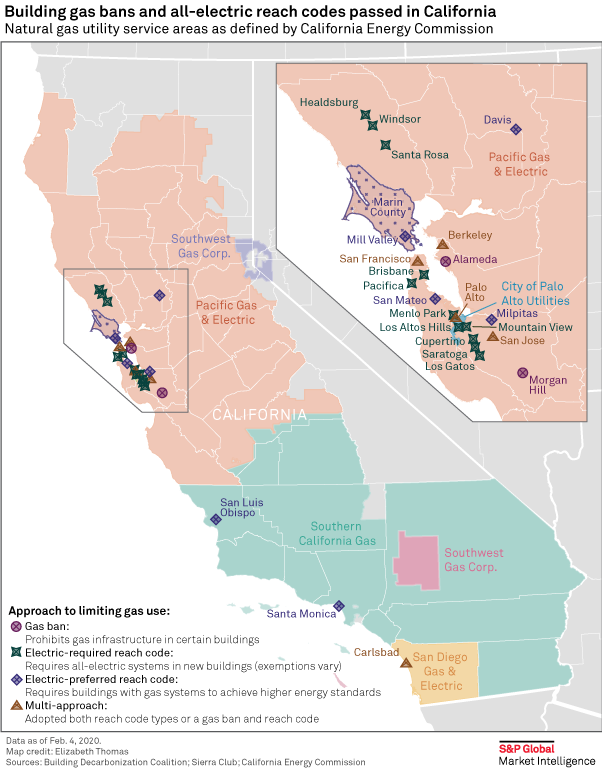Gas Pipeline Companies Take Electrification in Stride, But Long-Term Costs Loom

By Allison Good
March 3, 2020 - While natural gas pipelines' long-term contracts insulate them financially from an emerging movement to prohibit gas infrastructure in new buildings and renovations, some industry experts said those bans do signal the long-term potential for stranded midstream assets.
Since 2019, the anti-gas movement has gained momentum through electrification measures cropping up in California, the Boston area and Washington state amid concern over global warming and the contribution of fossil fuels to it. Many of the pipeline companies that deliver gas to utility customers have called for mitigating the sector's negative climate impacts, but they also maintain that gas transportation systems provide unmatched environmental and economic benefits that will ultimately help phase in a cleaner energy economy.
The gas bans may not pose an immediate threat to pipelines, but if they remain in place midstream firms could begin to incur costs down the road as contracted capacity rolls off.
"Due to the sporadic distribution of the gas bans, and the generally long-term contracts involved in gas pipeline transportation, and the dependence of the majority of the nation on natural gas for heat, food preparation, and industry, it seems like the near-term revenue risk is fairly low as is the risk of stranded assets," Regulatory Research Associates analyst Brian Collins said in an email. "However, looking ahead one or two decades, the gas ban moves could begin to limit the value of pipelines and gas distribution networks."

When it comes to how much pipeline companies are worth amid the transition to renewable sources, Andrew Logan, senior director of oil and gas at shareholder advocacy group Ceres, added that the stock market is forward-thinking and expects to see that reflected in equity values before assets become stranded.
"If something is going to have a material impact in a decade, one would assume that the valuation [of a company] would start taking that into account earlier," he said in an interview.
The bans alone, however, are not ultimately what will put gas pipeline operators out of business, he said.
"It's more of the broader context they are signaling around gas demand growing forward," Logan said. "There continues to be a lot of hope from the natural gas industry that residential demand will continue to grow in the future ... but the bans do seem to chip away at the idea that there is much growth to come for anyone in the gas pipeline business."
Companies such as Kinder Morgan Inc. are searching for a middle ground. CEO Steven Kean during a Jan. 29 investor conference criticized the gas bans because "not letting people have gas stoves in Berkeley, for example, is not going to solve [climate change]." At the same time, some states' renewable energy targets could still allow the pipeline giant to play a key role in providing intermittent power generation capacity.
"We're seeing an opportunity and a need from our customers to change the character of our transportation services to be more deliverability-related and pressure-related than steady-state, 24-hour operable," Tom Martin, president of the company's natural gas pipelines group, said during the conference. "We see that as the current and next wave of opportunities to go across the country to repackage our capacity and serve those market needs backfilling renewable intermittency."
Former Interstate Natural Gas Association of America President and CEO Donald Santa agreed in a recent interview that "natural gas has a continued role to play in firming up intermittent renewables" in the U.S.
Meanwhile, pipeline companies got a boost from Arizona on Feb. 21 when it became the first state in the nation to prohibit local governments from adopting measures that would ban natural gas use in new buildings. The Arizona legislation breezed through the GOP-controlled legislature, taking just three weeks between first reading and passage. Republicans in both chambers voted unanimously to support the bill, with several House and Senate Democrats crossing party lines to support it.
Gibson Dunn & Crutcher LLP attorney William Scherman said that while local and federal courts will probably strike down most of the bans, "there's no doubt ... that they are the flavor of the day" and he expects more municipalities to seek to enact them.

